Of all the overseas destinations that out-of-work NBA players ventured to during this crazy offseason, China scored some of the biggest names. The CBA is also the only league that forbade out clauses. Now, with the lockout wrapping up and NBA basketball games on the way in less than a month, will they stick to their guns and force the likes of Wilson Chandler, JR Smith, Kenyon Martin, and Aaron Brooks to fulfill their commitments? Many have come to the conclusion that there must be ”handshake deals” in place that will allow the big-name imports to break away from their contracts and head back to the States. According to reputable NBA reporter Adrian Wojnarowski, there are no such agreements. Via his Twitter…
This leads me to the following question: why should the CBA let these guys off the hook? Martin, Chandler, Smith, and Brooks are all grown men. They knew exactly what they were getting into when they signed their deals. They accepted the stipulations (no out clauses) and signed on the dotted line. If they now feel that they made a big mistake, well, they’ve got no one to blame but themselves. I don’t necessarilly think they should feel that way, though. Not unless they suffer a major injury or something. These guys are all getting paid well (Kenyon Martin in the $3 million range, for example), and the people of China love them to death. China is a basketball-crazed nation, and these guys are some of the best to ever play the game on their turf. They’re all rockstars right now. They should be mature about the situation, live up to their agreements, and sign NBA deals in March.
We all know how business works, though. So, why should CBA teams let their star import off the hook? They obviously shouldn’t have to… but maybe my question is better worded as follows: why would they? Disputes in business situations are all about leverage, not what’s fair, and even a player with no out clause has the following card to play: “I’m just gonna stop trying, be more of a headache than I’m worth, and essentially force you to give me what I want.” Unfortunately, this card has been proven effective in the world’s most predominant basketball league (does Melo to the Knicks ring a bell?). So, why won’t it work in the CBA? Here’s why (also via Wojnarowski’s Twitter)…
If you’ve followed the JR Smith situation at all then you’re already aware of how things in China differ from the United States. Players don’t run the show over there. It’s team first, no matter how many bells your name rings in NBA circles.
It’s really refreshing to see the CBA sticking to their guns here. They handled the opportunity presented to them by the NBA lockout the right way, and they deserve to reap the benefits. Way back in the summer they resisted the temptation to basically rent a bunch of NBA players by allowing their teams to sign free agents only. They turned some big-name guys away with their no-out-clause rule, but now their league is better for it. As of right now, CBA teams have played a maximum of four regular season games. Had they allowed non-free agents and out clauses, yeah, it would’ve been four insanely interesting rounds of Chinese basketball. However, it also would’ve left them with a decimated league just a few weeks in. The CBA did this right. They opted for the most intriguing season in their history rather than the most intriguing four rounds.
Hopefully none of this will even be relevent because Smith, Chandler, Martin, and Brooks all do the right thing and play their hardest through the duration of their CBA contracts.


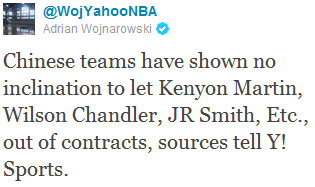
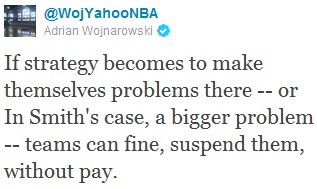
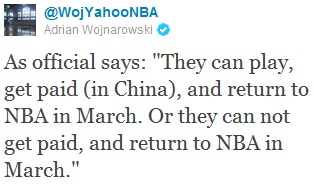









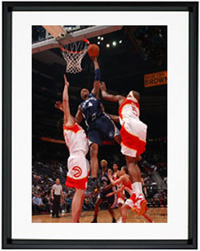
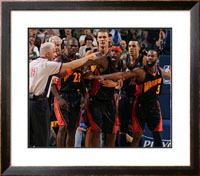


Pingback: Baloncesto en Internet: el mercado en España, Europa y NBA - BasketBlog